Nissan Juke vs VW Passat – Which model is better for everyday use?
Both models have their strengths – but which one suits you more?
Compare performance, efficiency, price and space directly: Nissan Juke or VW Passat?
Here’s where it gets real: The technical differences in detail
Costs and Efficiency: When it comes to price and running costs, the biggest differences usually appear. This is often where you see which car fits your budget better in the long run.
Nissan Juke has a significantly advantage in terms of price – it starts at 21400 £, while the VW Passat costs 35700 £. That’s a price difference of around 14349 £.
Fuel consumption also shows a difference: the VW Passat manages with 0.30 L and is therefore significantly more efficient than the Nissan Juke with 4.70 L. The difference is about 4.40 L per 100 km.
Engine and Performance: Power, torque and acceleration are the classic benchmarks for car enthusiasts – and here, some clear differences start to show.
When it comes to engine power, the VW Passat has a significantly edge – offering 272 HP compared to 143 HP. That’s roughly 129 HP more horsepower.
In acceleration from 0 to 100 km/h, the VW Passat is clearly quicker – completing the sprint in 5.80 s, while the Nissan Juke takes 10.10 s. That’s about 4.30 s faster.
In terms of top speed, the VW Passat performs noticeable better – reaching 250 km/h, while the Nissan Juke tops out at 180 km/h. The difference is around 70 km/h.
There’s also a difference in torque: the VW Passat pulls decisively stronger with 400 Nm compared to 200 Nm. That’s about 200 Nm difference.
Space and Everyday Use: Beyond pure performance, interior space and usability matter most in daily life. This is where you see which car is more practical and versatile.
Both vehicles offer seating for 5 people.
In curb weight, the Nissan Juke is distinct lighter – 1274 kg compared to 1573 kg. The difference is around 299 kg.
In terms of boot space, the VW Passat offers clearly perceptible more room – 690 L compared to 422 L. That’s a difference of about 268 L.
In maximum load capacity, the VW Passat performs clearly perceptible better – up to 1920 L, which is about 615 L more than the Nissan Juke.
When it comes to payload, VW Passat distinct takes the win – 577 kg compared to 427 kg. That’s a difference of about 150 kg.
All in all, the VW Passat shows itself to be outperforms in nearly all aspects and secures the title of DriveDuel Champion.
It impresses with the more balanced overall package and proves to be the more versatile companion for everyday use.
Nissan Juke
The Nissan Juke stands out with its distinctive design and bold styling, making it a popular choice for those seeking something different on the road. Its interior cleverly combines modern technology with comfort, offering an enjoyable driving experience for both the driver and passengers. Despite its compact size, the Juke provides a surprising amount of space and versatility, making it suitable for urban adventures and weekend getaways alike.
details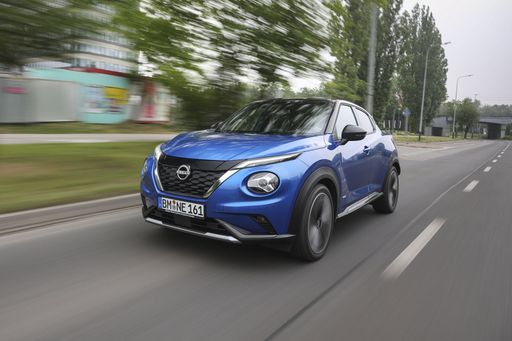 @ germany.nissannews.com
@ germany.nissannews.com
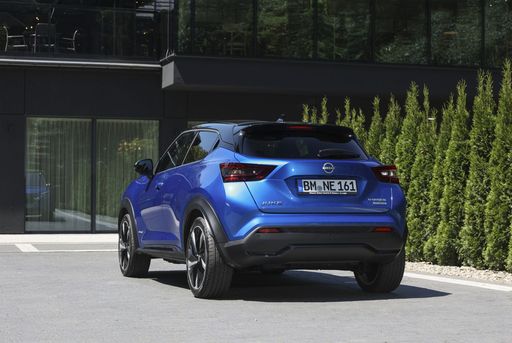 @ germany.nissannews.com
@ germany.nissannews.com
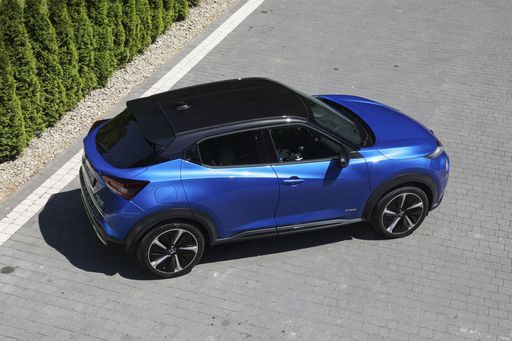 @ germany.nissannews.com
@ germany.nissannews.com
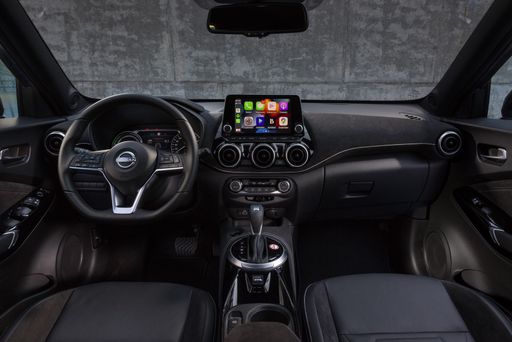 @ germany.nissannews.com
@ germany.nissannews.com
VW Passat
The VW Passat is a staple in the family saloon segment, known for its refined design and practicality. It effortlessly combines a comfortable ride with a spacious interior, making it a popular choice for long journeys. The cabin features high-quality materials and an intuitive infotainment system, providing a premium feel without sacrificing user-friendliness.
details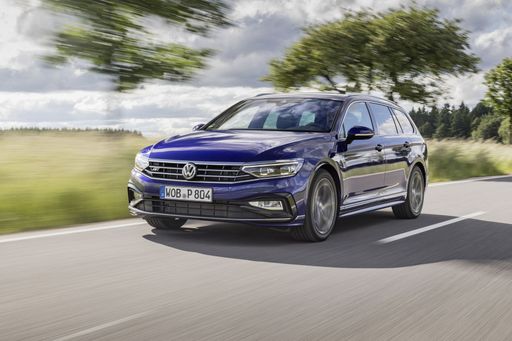 @ volkswagen-newsroom.com
@ volkswagen-newsroom.com
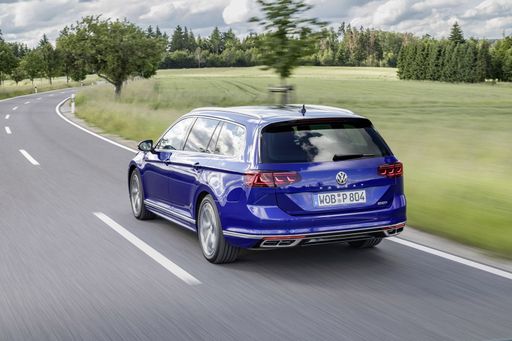 @ volkswagen-newsroom.com
@ volkswagen-newsroom.com
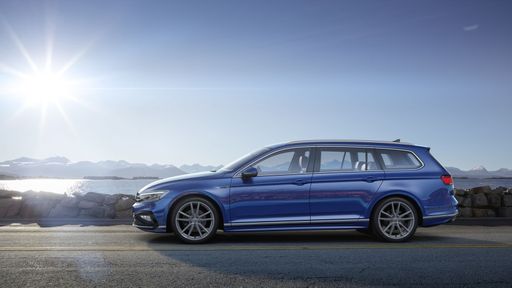 @ volkswagen-newsroom.com
@ volkswagen-newsroom.com
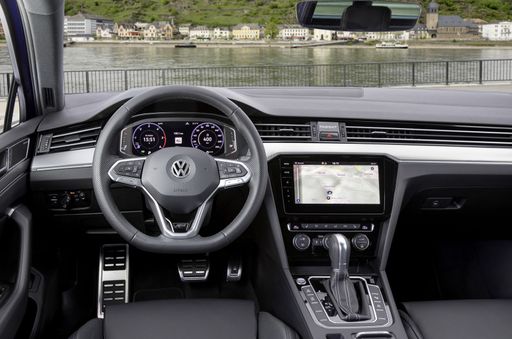 @ volkswagen-newsroom.com
@ volkswagen-newsroom.com

|

|
|
|
|
Costs and Consumption |
|
|---|---|
|
Price
21400 - 30100 £
|
Price
35700 - 58500 £
|
|
Consumption L/100km
4.7 - 6 L
|
Consumption L/100km
0.3 - 8 L
|
|
Consumption kWh/100km
-
|
Consumption kWh/100km
-
|
|
Electric Range
-
|
Electric Range
124 - 133 km
|
|
Battery Capacity
0.60 kWh
|
Battery Capacity
19.70 kWh
|
|
co2
107 - 136 g/km
|
co2
7 - 181 g/km
|
|
Fuel tank capacity
46 L
|
Fuel tank capacity
45 - 66 L
|
Dimensions and Body |
|
|---|---|
|
Body Type
SUV
|
Body Type
Estate
|
|
Seats
5
|
Seats
5
|
|
Doors
5
|
Doors
5
|
|
Curb weight
1274 - 1405 kg
|
Curb weight
1573 - 1858 kg
|
|
Trunk capacity
354 - 422 L
|
Trunk capacity
510 - 690 L
|
|
Length
4210 mm
|
Length
4917 mm
|
|
Width
1800 mm
|
Width
1849 mm
|
|
Height
1593 mm
|
Height
1521 mm
|
|
Max trunk capacity
1237 - 1305 L
|
Max trunk capacity
1770 - 1920 L
|
|
Payload
405 - 427 kg
|
Payload
501 - 577 kg
|
Engine and Performance |
|
|---|---|
|
Engine Type
Petrol, Full Hybrid
|
Engine Type
Plugin Hybrid, Petrol, Petrol MHEV, Diesel
|
|
Transmission
Manuel, Automatic
|
Transmission
Automatic
|
|
Transmission Detail
Manual Gearbox, Dual-Clutch Automatic, Automatic Gearbox
|
Transmission Detail
Dual-Clutch Automatic
|
|
Drive Type
Front-Wheel Drive
|
Drive Type
Front-Wheel Drive, All-Wheel Drive
|
|
Power HP
114 - 143 HP
|
Power HP
122 - 272 HP
|
|
Acceleration 0-100km/h
10.1 - 11.8 s
|
Acceleration 0-100km/h
5.8 - 10.7 s
|
|
Max Speed
166 - 180 km/h
|
Max Speed
212 - 250 km/h
|
|
Torque
200 Nm
|
Torque
250 - 400 Nm
|
|
Number of Cylinders
3 - 4
|
Number of Cylinders
4
|
|
Power kW
84 - 105 kW
|
Power kW
90 - 200 kW
|
|
Engine capacity
999 - 1598 cm3
|
Engine capacity
1498 - 1984 cm3
|
General |
|
|---|---|
|
Model Year
2024
|
Model Year
2024 - 2025
|
|
CO2 Efficiency Class
D, E, C
|
CO2 Efficiency Class
B, G, D, E
|
|
Brand
Nissan
|
Brand
VW
|
What drive types are available for the Nissan Juke?
Available configurations include Front-Wheel Drive.
The prices and data displayed are estimates based on German list prices and may vary by country. This information is not legally binding.
